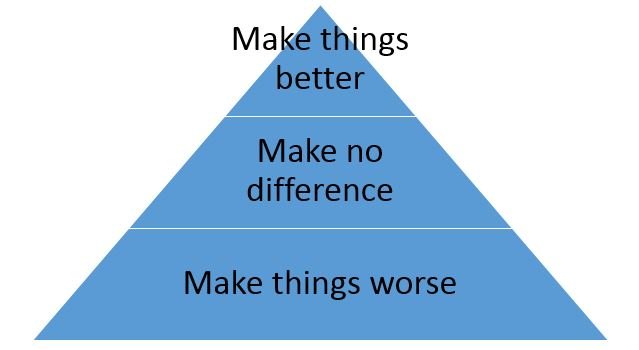Management Skills: Continuous Improvement
Management Skills: Continuous Improvement
Continuous improvement is about striving always to make things better.
Every day, strive to make things just a little better, than they currently are.
Continuous improvement is the idea that giant improvements are the sum of many small improvements.
Making giant improvements in anything is difficult. So instead, we try to make small improvements, but we make a lot of them. We try to make small improvements all the time.
You can look at it this way, when you enter a room or situation, what you do in that situation might either:
- Improve the situation,
- Not improve the situation,
- Make the situation worse.

Your aim is always to try to make any situation marginally better.
Every time you go to a meeting, try to ensure that your contribution makes the meeting better. Make sure that your presence is not neutral in its effects, and especially, make sure that your presence is not a negative factor in the meeting.
Every time you go into a kitchen, try to make sure that when you leave it, then leave it in a better state than when you found it.
Don't leave it the same. And don't leave it in a worse condition.
Every time you talk to a person, try to make sure that you when you leave the person, that person feels better for having spoken to you; try not to leave them unmoved, and certainly try NOT to leave them in a worse mood for having spoken to you.
In every situation, please strive to make it a bit better than when you found it.
Don't leave it the same. Don't make it any worse.
Can you imagine the reputation you would develop if, everywhere you went, things were better for your presence?
You would gain a reputation for being a good person to have around.
And can you imagine what would happen if you gained the reputation that it made no difference if you were there or not?
Or if you gained the reputation for leaving a trail of destruction, or a mess, or a bad feeling, wherever you went?
Commit yourself to continuous improvement.
Make every situation, every person, every meeting and every team, a little better, every time.
If you did that, a year from now, you could be doing well.
Strive to continually improve everything and everybody.
Definition: Continuous improvement
Continuous improvement is a business principle. It means you and your team look at work every day and find small ways to make it better. The effort never stops; each little gain adds value and soon adds up to big progress. You watch results, learn, and act again, all the time.
Show CG4D Definition
- takes place in never-ending, day-to-day effort
- uses many small changes, not one huge change
- aims to make each task, place, or team slightly better
- depends on steady check and action by the people doing the work
Article Summary
Continuous improvement means choosing small, useful acts each day that leave every task, room and person better than before; those tiny gains soon build major success.
Frequently Asked Questions
Here are some questions that frequently get asked about this topic during our training sessions.
What does continuous improvement mean in simple words?
Why do many small improvements beat one big change?
How can I use continuous improvement at work today?
How does daily improvement grow my professional reputation?
What is a quick way to add value in a meeting?
How can managers spark a culture of continuous improvement?
Is continuous improvement only useful for large projects?
Thought of something that's not been answered?
Did You Know: Key Statistics
Gallup’s State of the Global Workplace 2023 shows that teams with high engagement post 23% higher profit and 18% higher output than low-engagement teams. A 2022 McKinsey survey of 400 operations leaders found that firms that adopt steady improvement methods cut process lead time by about 30% in one year.Blogs by Email
Do you want to receive an email whenever we post a new blog? The blogs contain article 5-10 minutes long - ideal for reading during your coffee break!
Further Reading in Leadership and Management
-
The Language of Leadership
Learn how leadership language sets vision, outlines strategy and sparks motivation. Master clear, confident words that lift engagement, trust and profit.
Read Article > -
Leadership training - Success principles
Leadership training built on initiative, persistence and preparation removes anger, pessimism and entitlement, boosting team performance and lasting success.
Read Article > -
What are the Qualities of a Thought Leader?
Discover thought leader qualities like clarity, logic and optimism. Master clear communication to shape minds, build trust and drive change in your field.
Read Article > -
Where can I find a good team leader training course?
Choose team leader training that builds seven core skills: goal focus, sound planning, clear words, united action, fair feedback, real praise and calm change.
Read Article > -
Achieving Goals, Not Just Tasks
Shift your team from task ticking to goal achievement. Learn how praise, profit share, career growth and training create rewards that ignite employee drive.
Read Article >
Looking for Leadership and Management Training?
If you're looking to develop your Leadership and Management Skills, you may find this Leadership and Management Training Course beneficial:
Open Training Course Pricing and Availability
Next Open Course Starts in 12 days, London - Central, places available







